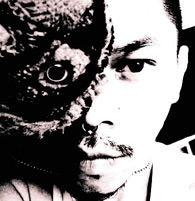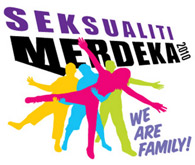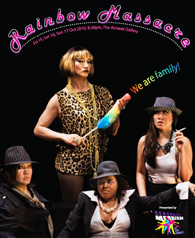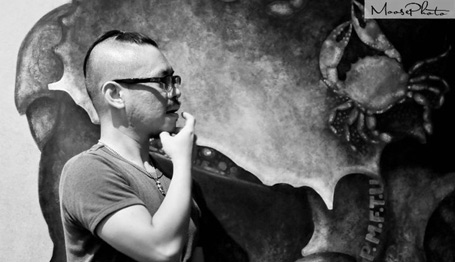“Many LGBTs are against any form of visibility, preferring to remain under the radar and in the closet,” said Jerome Kugan when asked what led him to co-found Seksualiti Merdeka (meaning independence and/or freedom in Bahasa Melayu) in 2008.
But Kugan, an openly gay singer-songwriter and writer moved from Sabah, East Malaysia to Kuala Lumpur ten years ago said he “decided that lying low is not the answer.”
“Too many people are still suffering the effects of homophobia and the violence and discrimination caused by it. It gives me a good feeling to see the community having the space to carry on an open discourse about sex, sexual identity and sexuality rights, because there’s so little space for it elsewhere in this country,” he explained.
The festival begins on Wednesday and will feature talks, forums, workshops, art, theatre, music and films from October 13-17 in Kuala Lumpur.
æ: Age, sex, occupation, location?

Jerome: 35, male, writer/poet/singer-songwriter, media manager of The Annexe Gallery and co-organiser of Seksualiti Merdeka festival, Kuala Lumpur
æ: The third edition of Seksualiti Merdeka (SM) is just round the corner. Since its inception, it has been positioned as a sexuality rights (as opposed to a gay rights or pride) festival. Why was the rationale?
Jerome: It was decided by the first SM organising committee and we’ve stuck to it since. We decided that because we felt that in this country, everyone's sexuality rights, not just the LGBT community, are affected. And that there is dire need to address that.
æ: Tell me a little bit about yourself and your background, and what led you to co-found the festival?
Jerome: I moved to Kuala Lumpur from my hometown Kota Kinabalu, Sabah, 10 years ago, looking for more interesting employment opportunities. Since then I’ve been establishing myself in the local arts and media community by working with various artists and musicians, organising events, writing for publications and meeting like-minded people for inspiration and whatnot. During that time, I’ve had the pleasure of meeting a host of individuals who worked in the field of human rights and their work inspired me to contribute my little part to making people aware of the injustices happening in the country.
As a gay man in Malaysia, I feel for my fellow LGBT friends whose rights are undermined because of our sexuality and/or gender identity. Not everyone in the community feels the same way. In fact, many LGBTs are against any form of visibility, preferring to remain under the radar and in the closet. But with the support of friends like SM co-founder Pang Khee Teik, I decided that lying low is not the answer. Too many people are still suffering the effects of homophobia and the violence and discrimination caused by it. And that is really the main reason why I co-founded the festival – I did it for the benefit of my friends and myself. It gives me a good feeling to see the community having the space to carry on an open discourse about sex, sexual identity and sexuality rights, because there’s so little space for it elsewhere in this country.
æ: What role does the festival play in KL's LGBT community?
Jerome: We serve as a platform for anyone who wishes to have an open dialogue about sexuality rights in Malaysia. We wish to open people’s minds, within and outside the community, to challenge long held notions, to consider alternative perspectives, and to help understand each other better. It’s also a space for individuals and organisations working in the field of sexuality rights to come together and share their knowledge and network of contacts so that we stand to benefit from each other’s work. SM also works as an entry point for people with a passing interest in issues that affect the LGBT community. We're like the soft approach.
æ: How has the event grown – in terms of attendees and programming – in the last three years?

Jerome: SM started in 2008 as a two-day event with a programme of talks, lectures, workshops and presentations about sexuality rights, which was tagged to an arts event called Art For Grabs that we regularly organise at The Annexe Gallery. In that first year, we estimated that we had 400 people in attendance. Frankly we were very surprised. To our knowledge, it was the first time an event of its kind was ever held in Malaysia and we were happy to see that there was interest in it both from and beyond the LGBT community. Last year we decided to expand it into a standalone weeklong programme that included film screenings, theatre and music performances to attract people and we estimated the attendance at 800. This year we’re doing an equally extensive programme spread over two weeks, including taking a forum theatre performance written by Singapore playwright and poet Alfian Sa’at about the issue of coming out to a few colleges around the Klang Valley. That’ll be the first time we’re taking a festival event out of The Annexe Gallery. We hope to reach out to at least 1,200 people. Fingers crossed.
æ: There always seem to be a dilemma about how publicly should the events be advertised on Facebook and other channels, not just in Malaysia but also in other countries where LGBT activism is or is perceived to be sensitive topic. How do organisers negotiate these issues not just with the authorities but also with the community in the hopes that they will attend?
Jerome: SM is made up of various groups and individuals with different levels of comfort in regards to how visible they wish to appear, with good reason. We try our best to accommodate to everyone’s needs. In general, we try not to disseminate information about the festival to people or groups who have a track record of being LGBT-unfriendly and this includes some of the major newspapers. Most of our promotion work is done online through our website, Facebook, and mailing lists over which we have some measure of control. There are other things that we do to keep the fest rather low-key, but I don’t want to say too many things about that. If people want to know, I’d rather that they talk to us individually.
æ: Aside from the above, what would you say are the biggest challenges organising the festival?
Jerome: Getting funding is perhaps our single biggest problem. We’re a small team and I think we’ve done enough work in this area to know what will and what won’t work. But we don’t really have much access to a lot of money. We need more.
æ: What are the highlights this year?
Jerome: A new thing we’re doing this year is a theatre forum performance written by Singaporean Alfian Sa’at that we’re taking to some of the colleges around the Klang Valley. The short play deals with the issue of coming out to one’s family, which is related to this year’s SM theme “We Are Family”. It’s the first time we’ve done one of the festival’s events outside of The Annexe Gallery venue. It’s something we’ve been wanting to do for a while now but we’ve just been waiting for the right vehicle to come along that would allow us to do that. There’s also HerStory Films Project, which is a showcase of five short films by Malaysian women filmmakers that deal with themes of desire, sex and love. The late Yasmin Ahmad’s muse Sharifah Amani is debuting a film of hers called “Sangkar” (Cage). Renowned historian Dr Farish Noor will be delivering a talk about the history of modesty in South East Asia that will end with a fashion show of vintage Peranakan lingerie. I’m looking forward to that... and also there’s the three-night concerts called Rainbow Massacre, featuring some of the best singers in KL.
æ: What's Rainbow Massacre all about? What inspired it?

Music Performance
Admission by donation RM40 (At the door), RM35 (Online pre-show sale). Buy tickets online on applause.org.my
Jerome: Rainbow Massacre is really the ultimate feel-good event of the festival. It’s a music concert featuring a fabulous list of performers singing queer anthems, or songs that they feel encapsulate the spirit of Seksualiti Merdeka. Most of it is pop music, songs that most everyone will know. It may not have a big activist component to it, but it’s fun and reminds us of the way of life we’re trying so hard to protect. I’m the director and performing for this round. And, of course, there’s our fabulous drag queen emcee Shelah!!! who is one of my heroes.
About seven years ago, before Seksualiti Merdeka, Pang mooted the idea of organising a series of "Massacre" concerts that poked fun at popular songs in a camp way, or playing with the gender or sexual dynamics of the original song. I liked the idea. It's not totally original, but thought that it had potential to explore some notions about gender and sexuality in song. We decided to do the first Massacre concert, Torch Song Massacre, last year during Valentine's Day, in which we asked performers to skewer songs of tragic love and heartbreak. People loved it. We've continued doing it since, inviting a different set of performers each time.
æ: What is your vision for the LGBT community in Malaysia?
Jerome: Ultimately, acceptance. I want to see the sodomy laws removed from the books. [377A and 377B of Malaysia’s Penal Code imposes a jail term of up to twenty years and whipping for “carnal intercourse against the order of nature.”] I want to see anti-discriminatory laws put in place. I want to see same-sex marriage. It's not going to be easy. Malaysia claims to be a secular Muslim country, but over the past three decades it's becoming more conservative and fundamentalist. I don't like that at all, because I don't think it's healthy and I feel it doesn't reflect who we are as Malaysians. We are a country with a rich and progressive multicultural, multisexual legacy. There's no reason at all why the present and future generations should stop adding to this legacy. Politicians are always talking nonsense about promoting Malaysia as a world leader in this and that, and here is a chance to become a world leader – let's change the world's attitude, let's set a precedent, let's become the world's first secular Muslim country to accept LGBTs. Maybe that's too optimistic and idealistic. The reality is really kind of depressing. But I can't deny the person that I am. I'm a dreamer.
Schedule of events
Wed, 13 Oct, 8pm
SEKSUALITI MERDEKA LAUNCH
Thu 14 Oct, 8pm
HERSTORY FILMS PROJECT: LOVE, SEX & DESIRE
Fri 15, Sat 16, Sun 17 Oct, 8.30pm
RAINBOW MASSACRE 2010: WE ARE FAMILY!
Sat 16 Oct, 2pm
QUEER AS FILMS: FOCUS ON OUR FAMILY
Sun 17 Oct, 12pm
FARISH NOOR LECTURE: FROM MODESTY PLATES TO PERANAKAN LINGERIE
Sun 17 Oct, 2pm
QUEER AS BOOKS: THREE NEW TITLES
Sun 17 Oct, 4pm
EVEN EDUCATED FLEAS DO IT: SEX, SEXUALITY & DIVERSITY IN MALAYSIA
Free admission to all events unless otherwise noted. All events take place at The Annexe Gallery, 2nd Floor, Central Market Annexe (Behind Central Market), Kuala Lumpur. Tel: 03 2070 1137 Enquiries: seksualiti.merdeka@gmail.com. For more full schedule of events, click onto annexegallery.com












 Printable Version
Printable Version










